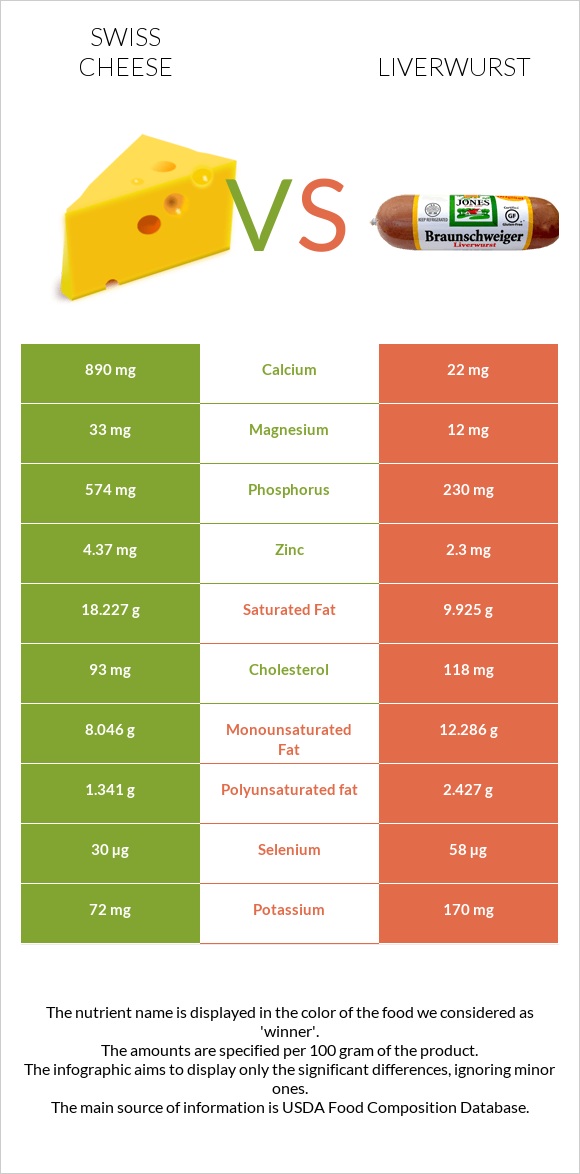Swiss cheese vs. Liverwurst — In-Depth Nutrition Comparison
Compare
Differences between Swiss cheese and liverwurst
- Swiss cheese is higher in calcium and phosphorus; however, liverwurst is richer in vitamin B12, vitamin A, iron, vitamin B2, vitamin B5, selenium, and vitamin B3.
- Liverwurst's daily need coverage for vitamin B12 is 433% higher.
- Swiss cheese has 40 times more calcium than liverwurst. While Swiss cheese has 890mg of calcium, liverwurst has only 22mg.
- Liverwurst has less saturated fat.
The food types used in this comparison are Cheese, swiss and Liverwurst spread.
Infographic

Infographic link
Mineral Comparison
Mineral comparison score is based on the number of minerals by which one or the other food is richer. The "coverage" charts below show how much of the daily needs can be covered by 300 grams of the food.
| Contains more MagnesiumMagnesium | +175% |
| Contains more CalciumCalcium | +3945.5% |
| Contains more ZincZinc | +90% |
| Contains more PhosphorusPhosphorus | +149.6% |
| Contains less SodiumSodium | -73.3% |
| Contains more PotassiumPotassium | +136.1% |
| Contains more IronIron | +6707.7% |
| Contains more CopperCopper | +410.6% |
| Contains more ManganeseManganese | +496.2% |
| Contains more SeleniumSelenium | +93.3% |
Vitamin Comparison
Vitamin comparison score is based on the number of vitamins by which one or the other food is richer. The "coverage" charts below show how much of the daily needs can be covered by 300 grams of the food.
| Contains more Vitamin EVitamin E | +∞% |
| Contains more Vitamin KVitamin K | +∞% |
| Contains more Vitamin CVitamin C | +∞% |
| Contains more Vitamin AVitamin A | +1320.5% |
| Contains more Vitamin B1Vitamin B1 | +2372.7% |
| Contains more Vitamin B2Vitamin B2 | +241.1% |
| Contains more Vitamin B3Vitamin B3 | +6618.8% |
| Contains more Vitamin B5Vitamin B5 | +735.7% |
| Contains more Vitamin B6Vitamin B6 | +167.6% |
| Contains more Vitamin B12Vitamin B12 | +339.9% |
| Contains more FolateFolate | +200% |
All nutrients comparison - raw data values
| Nutrient |  |
 |
DV% diff. |
| Vitamin B12 | 3.06µg | 13.46µg | 433% |
| Vitamin A | 288µg | 4091µg | 423% |
| Iron | 0.13mg | 8.85mg | 109% |
| Calcium | 890mg | 22mg | 87% |
| Vitamin B2 | 0.302mg | 1.03mg | 56% |
| Vitamin B5 | 0.353mg | 2.95mg | 52% |
| Selenium | 30µg | 58µg | 51% |
| Phosphorus | 574mg | 230mg | 49% |
| Saturated fat | 18.227g | 9.925g | 38% |
| Protein | 26.96g | 12.38g | 29% |
| Vitamin B3 | 0.064mg | 4.3mg | 26% |
| Sodium | 187mg | 700mg | 22% |
| Vitamin B1 | 0.011mg | 0.272mg | 22% |
| Copper | 0.047mg | 0.24mg | 21% |
| Zinc | 4.37mg | 2.3mg | 19% |
| Monounsaturated fat | 8.046g | 12.286g | 11% |
| Fiber | 0g | 2.5g | 10% |
| Fats | 30.99g | 25.45g | 9% |
| Vitamin B6 | 0.071mg | 0.19mg | 9% |
| Cholesterol | 93mg | 118mg | 8% |
| Polyunsaturated fat | 1.341g | 2.427g | 7% |
| Manganese | 0.026mg | 0.155mg | 6% |
| Magnesium | 33mg | 12mg | 5% |
| Folate | 10µg | 30µg | 5% |
| Calories | 393kcal | 305kcal | 4% |
| Vitamin C | 0mg | 3.5mg | 4% |
| Vitamin E | 0.6mg | 4% | |
| Potassium | 72mg | 170mg | 3% |
| Choline | 15.5mg | 3% | |
| Carbs | 1.44g | 5.89g | 1% |
| Vitamin K | 1.4µg | 1% | |
| Net carbs | 1.44g | 3.39g | N/A |
| Sugar | 0g | 1.65g | N/A |
| Trans fat | 0.987g | N/A | |
| Tryptophan | 0.401mg | 0.151mg | 0% |
| Threonine | 1.038mg | 0.671mg | 0% |
| Isoleucine | 1.537mg | 0.653mg | 0% |
| Leucine | 2.959mg | 1.139mg | 0% |
| Lysine | 2.585mg | 1.155mg | 0% |
| Methionine | 0.784mg | 0.285mg | 0% |
| Phenylalanine | 1.662mg | 0.617mg | 0% |
| Valine | 2.139mg | 0.857mg | 0% |
| Histidine | 1.065mg | 0.448mg | 0% |
| Omega-3 - ALA | 0.125g | N/A | |
| Omega-3 - DPA | 0.018g | 0g | N/A |
| Omega-3 - Eicosatrienoic acid | 0.003g | N/A | |
| Omega-6 - Gamma-linoleic acid | 0.002g | N/A | |
| Omega-6 - Dihomo-gamma-linoleic acid | 0.032g | N/A | |
| Omega-6 - Eicosadienoic acid | 0.007g | N/A | |
| Omega-6 - Linoleic acid | 0.734g | N/A |
Macronutrient Comparison
Macronutrient breakdown side-by-side comparison
Protein:
26.96 g
Fats:
30.99 g
Carbs:
1.44 g
Water:
37.63 g
Other:
2.98 g
Protein:
12.38 g
Fats:
25.45 g
Carbs:
5.89 g
Water:
53.53 g
Other:
2.75 g
| Contains more ProteinProtein | +117.8% |
| Contains more FatsFats | +21.8% |
| Contains more CarbsCarbs | +309% |
| Contains more WaterWater | +42.3% |
~equal in
Other
~2.75g
Fat Type Comparison
Fat type breakdown side-by-side comparison
Saturated fat:
Sat. Fat
18.227 g
Monounsaturated fat:
Mono. Fat
8.046 g
Polyunsaturated fat:
Poly. Fat
1.341 g
Saturated fat:
Sat. Fat
9.925 g
Monounsaturated fat:
Mono. Fat
12.286 g
Polyunsaturated fat:
Poly. Fat
2.427 g
| Contains less Sat. FatSaturated fat | -45.5% |
| Contains more Mono. FatMonounsaturated fat | +52.7% |
| Contains more Poly. FatPolyunsaturated fat | +81% |





